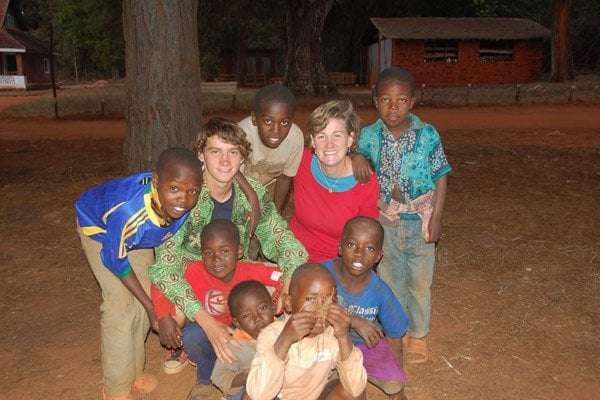Why did you decide to volunteer abroad with Global Volunteers in Tanzania?
Amy: My husband and I have four sons, Matt, Jack, Dan, and Ryan. In 2007 Matt was invited to participate in an educational travel program designed for high school students. Having remembered seeing a piece on The Today Show a number of years previously on short-term volunteering abroad, Matt and I began to investigate Global Volunteers. Since 1987 Global Volunteers has worked in partnership with local leaders in over 15 countries around the world to bring human and economic resources to children and families in remote areas such as the small village of Pommern, in the southern highlands of Tanzania.
Although Tanzania is an emerging and very safe country, it continues to be one of the most disadvantaged countries in the world. While drawn by the opportunity to meet new people and experience a new culture, what quickly convinced us to go was Global Volunteers itself. Global Volunteers is guided by a unique philosophy of service, stating simply, “that to be truly successful in sustainable development assistance, volunteers must work at the invitation, and under the direction, of those they are attempting to assist. Local people are always in charge.” Global Volunteers believes that true development mobilizes empowered people: both those seeking assistance, and those who seek to serve them. Matt and I had the privilege to serve with GV in 2008. I then returned with my son Jack in 2008, and will return in July 2012 with Dan and Ryan.

Describe what it's like to be a volunteer in Tanzania with Global Volunteers.
Amy: In the Iringa district where the village of Pommern is located, the needs are immense and resources are few. Although Pommern is high on a mountain, there are many smaller villages further up, forcing villagers to walk 25km to come to the clinic, school, or to catch the daily bus to Iringa. Homes are made of sun-baked mud bricks, and must be re-bricked each year before the rainy season begins in December. Most roofs are thatched, but a few have corrugated metal roofs. A few of the buildings in the village receive electricity from a generator from 7-10PM each night. On each of our trips, all the members of our GV service teams took turns rotating jobs throughout the village, working on labor projects, teaching at one of the local schools, or assisting in the local clinic or remote clinic.
If one of the volunteers had a particular interest or talent to share they were always graciously received and encouraged. For example, when at the vaccination clinic we spent a morning weighing babies, recording the vaccination schedule, and administering the necessary immunizations. Working to assist the doctors and nurses, a bed functioned as our examining table and work surface, while the mothers and children waited patiently for hours on end until we could help each of them. Nervous about teaching, Matt found his niche teaching computer skills at the secondary school, while Jack had a blast teaching conversational English at the primary school.
After a successful lesson in the use of with, but, and then, I’ll never forget him trying to teach a group of 40 kids how to play “Heads Up, 7-Up”! Each afternoon after our teaching assignments were done, we worked on labor projects such as painting dorms, or resurfacing the floor of the mess hall. In the past teams built the school library, and put a new roof on the school kitchen that allowed for better ventilation. Until then, kitchen workers had routinely died from prolonged exposure to smoke.
How has this experience impacted your future?
Amy: My sons loved refining their masonry skills on the labor projects, learning to take vital signs and the procedures of meat inspection with the village doctor, and most especially, laughing and playing with the children each afternoon. “Priceless” is inadequate to describe the value of these moments in the lives of my children, but I think Jack summed it up beautifully for our team journal:
“When my mother and brother came to Pommern two years ago I couldn’t relate to them about what they experienced while they were here, but now that I have been here I can look back and see the change in them. It is very hard to explain and that is what I am worried about when I am back trying to explain my trip to my friends in America, but it is there.
I didn’t have a dramatic moment when I felt this new perspective become part of my outlook but now I know it is there. It comes from seeing the kids wearing the same clothes day in and day out, from watching the patients at the clinic fight their diseases and injuries with such courage, from watching how the students work hard all day long, and from seeing how Moses sleeps on a bed he made himself with an old torn-up blanket.
I feel like a different person now, and though I miss my friends and family, I never want to leave. I have become attached to the people here and my fellow team members. From the calls of “Jackie Jackie” as I walk through the village, or the warm mandazi while sitting on a bench packed with people watching the World Cup, Pommern has given me much more than I could ever repay, and I am grateful for this. I hope to take what I have learned here back to my day-to-day life in America. I will miss all of you and I hope to see you again.”